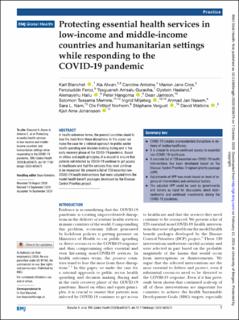Protecting essential health services in low-income and middle-income countries and humanitarian settings while responding to the COVID-19 pandemic
Blanchet, Karl; Alwan, Ala; Antoine, Caroline; Cros, Marion Jane; Feroz, Ferozuddin; Amsalu Guracha, Tseguaneh; Haaland, Øystein Ariansen; Hailu, Alemayehu; Hangoma, Peter; Jamison, Dean T.; Memirie, Solomon Tessema; Miljeteig, Ingrid; Jan Naeem, Ahmad; Nam, Sara L.; Norheim, Ole Frithjof; Verguet, Stéphane; Watkins, David; Johansson, Kjell Arne
Journal article, Peer reviewed
Published version

Åpne
Permanent lenke
https://hdl.handle.net/11250/2755775Utgivelsesdato
2020Metadata
Vis full innførselSamlinger
Sammendrag
In health outcomes terms, the poorest countries stand to lose the most from these disruptions. In this paper, we make the case for a rational approach to public sector health spending and decision making during and in the early recovery phase of the COVID-19 pandemic. Based on ethics and equity principles, it is crucial to ensure that patients not infected by COVID-19 continue to get access to healthcare and that the services they need continue to be resourced. We present a list of 120 essential non-COVID-19 health interventions that were adapted from the model health benefit packages developed by the Disease Control Priorities project.
